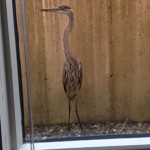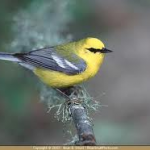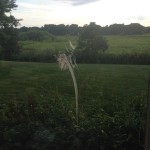There must be something about the fall that prompts birds to fly into our windows. Perhaps it is the lengthening rays and shortening days as the setting sun inches south across the horizon at the edge of the prairie. Perhaps the small birds see the sandhill cranes heading south, with their spindly leg floating behind them, or hear the flocks of gathering geese. Maybe the migrant birds are distracted by the unsettling thoughts of a harrowing migration while the year-round residents feel a growing anxiety as they anticipate a brutal winter. Whatever the reason, about once a week I hear the sickening thud as a bird collides with the window. One night, we were both startled by a deep and full-bodied thud and knew that it must be an owl. There on the back patio was a short-eared owl and in his mouth was a dead vole. We mourned not only for the owl, but also the collateral damage to the hungry owlets mewling in an abandoned nest.
Often, the birds will fall into the window well in front of my office, and I only spot them when I am changing the sheets in the basement guest room. Sometimes a diminutive skeleton is all that remains. If the birds hit the front door, they drop down onto the steps in full view. Yesterday, I spotted a small warbler as I stepped outside to greet arriving guests. I quickly stooped over to pick the bird up by its curled toes and discretely tossed it into the adjacent bush before the guests reached the door. If I had had the luxury of time, I would have walked across the lawn and tossed the bird into the prairie, where it would be promptly recycled by coyotes, owls or hawks.
The ornithologist John James Audubon studied and painted birds either from stuffed birds or their skins. I can imagine myself remotely following in his footsteps as I tenderly handle a brown creeper, a small bird that spirals up a tree trunk probing for insects, then flutters down and starts up again. I rarely see the creeper on my birdwatching walks. Its high wispy song is difficult to hear in the blowing wind and rustling leaves and its mottled earth tones provide a perfect camouflage against the tree. Now, on my front steps, I can study one in detail. I notice the stiff tail that it uses to prop itself up against the tree, and its sharp decurved beak, exquisitely designed for prying insects from the furrowed bark. The bird is tiny, weighing no more than a couple of pennies and I marvel that this year-round bird can withstand wild winds with rain, sleet or snow. But the bird is resolutely dead, and lacks the sprightliness and determination that I have seen in vivo.
I have been fortunate to participate at bird-banding stations where I can actually hold live birds in my hands. Birds become entangled in the fine netting stretched between trees in the dense underbrush. I then carefully extract the birds, place them in muslin bags and return to the processing station where I hold their necks gently between my first and second fingers as I weigh them and blow on their abdomens and “arm” pits to assess the fat reserves. The birds waiting to be banded must be kept warm, so I put the muslin bags inside my fleece jacket. It is an odd sensation to feel a fluttering bird against my beating heart. The final step is to put a tiny numbered band on their leg in the seemingly far-fetched hope that some other remote banding station will catch the same bird and track its movement.
I particularly remember a blue-winged warbler, netted as it wended its way northward from Central America. Before releasing it, I slipped its brittle legs between my fingers and held it up so that others could take pictures of this stunning yellow warbler with vaguely blue wings. Far more characteristic was a dark black streak through its eyes, looking like a hastily applied smear of mascara. I patted his head in a comforting way but then was dismayed by his accusatory stare. His sparkling and fierce eyes seemed to say, “I have made it this far on this fucking migration, and I am not about to let some fucking mist tent stop me on my way to Canada, it’s patronizing when you pat my head, so get your fucking hands off of me and let me go.” This was the spirit that Audubon was never able to capture in his prints.
The thudding birds create a very confusing psychological dilemma. My husband and I consider ourselves environmentally sensitive – we only use organic fertilizer, try to eat local, have replaced all appliances with energy-efficient upgrades, have a little plaque at the drive way entrance announcing that we have successfully participated in a “Conservation at Home” project, only turn on the air-conditioner when unprovoked sweat actually drips onto the keyboard, tried (mostly unsuccessfully) to limit ourselves to one tank of gasoline per month, and exult in our energy bill that shows that we are the most energy-efficient of our neighbors. But each deadly smack is a clear auditory message that no matter how well-meaning our efforts, we are intruders, that our house and windows are over-sized for our needs and that we have indirectly caused the death of an innocent bird.
There does not seem to be much I can do. Wrapping our house in protective netting or standing in front waving semaphore flags is not feasible. Decorating the windows with paste-on images of scary raptors might be an effective deterrent, but one that would impede the panoramic view of the prairie. This is a selfish concession that I am unwilling to make. Struggling to find solid footing, I pause to consider that while violent death is poignantly tragic in human terms, it is a way of life for many birds. In the spring, I see a proud goose leading a dozen goslings across the pond. The next day, there might only be ten, and the next day perhaps eight, and I shudder at the agony the baby must feel as he dips his webbed foot into the water only to have it snatched from below as a rapacious snapping turtle drags him to a watery death. We routinely see coyotes roam the field, pounce on a hapless vole, toss it in the air, and then swallow it in one gulp. Hovering hawks swoop down, lunging with outstretched talons, and then carry a squirming vole into the oak tree in the side yard. We rush out with binoculars to watch as the hawk shreds his prey into edible morsels. I try to convince myself that my introduction of a violent death by window pane is just another in the menu of nature’s options, but it’s a tough sell.
My remorse is deepened when I stand aside from the rough and tumble of nature and position myself a steward, a guardian angel for vulnerable creatures. When our dog captured a vole, I dropped the leash, ran to his side and began to tug at vole’s protruding head while the dog struggled to swallow it whole. While I was eager to witness a hawk shredding a vole, I was determined to save this one from our dog, even though he was really just asserting his ancestry as a hunter. I was so consumed with my tussle I didn’t realize that I was close to yanking the vole’s head right off. I let go just in time and relinquished the vole to a quick death.
My identity as a steward fully emerges when a bird flies into the window and doesn’t die, but lies fluttering and agonal on the steps. Perhaps I can reconcile a quick death, but not a lingering one. I was sitting at my desk last week when I noticed an approaching great blue heron and thought, “Wow he’s getting close,” and then suddenly !!BAM!! he smacked into the window and dropped like a rock into the window well.
I crept down into the basement to take a closer look, guiltily hoping that heron had died. What was I going to do with an injured heron in my window well? I was now at eye level with the heron and we stared directly at each other through the window. I recognized the same defiant and bright-eyed look that I had seen in my little blue-winged warbler.
 It seemed improbable that he could ever escape the window well on his own. It was too narrow for him to spread his wings, and his wings might have been broken anyway. The well looked far too deep for him to simply hop out and then perhaps stagger out to some lonely death in the brush. Our daughter Frances called the bird rescue hotline, and their very sobering advice was to only approach the trapped bird wearing goggles and a helmet, “They like to go for the eyes,” they said. I frequently see great blue herons standing mannequin-still at the edge of a pond, patiently waiting for the moment to strike with their formidable bills. I could easily envision a heron going for the soft and probably delectable human eyeball, then once extracted, tilting its head and swallowing it whole like a raw oyster.
It seemed improbable that he could ever escape the window well on his own. It was too narrow for him to spread his wings, and his wings might have been broken anyway. The well looked far too deep for him to simply hop out and then perhaps stagger out to some lonely death in the brush. Our daughter Frances called the bird rescue hotline, and their very sobering advice was to only approach the trapped bird wearing goggles and a helmet, “They like to go for the eyes,” they said. I frequently see great blue herons standing mannequin-still at the edge of a pond, patiently waiting for the moment to strike with their formidable bills. I could easily envision a heron going for the soft and probably delectable human eyeball, then once extracted, tilting its head and swallowing it whole like a raw oyster.
I considered fashioning a ramp out of an old door, and wondered if a heron could grok a ladder and hop out step by step. I tried to imagine some sort of sling-like contraption that could gently lift the heron out, but I also knew that it would probably thrash about and hurt itself in the process. Without a sedating dart gun, wild animals have the frustrating habit of confusing the tender ministrations of a steward with a more lethal agenda.
This was a Saturday night, and the bird rescue people said that nobody would be available until Monday. I considered a temporizing strategy of feeding frogs to the heron. A heavy rain forces frogs into our sump pump system and somehow they end up in our basement, though how they get from the utility room into the guest bedroom is a complete mystery. My sister-in-law was once startled from her pleasant respite on the porcelain throne by a nonchalant frog hopping by. My cousin Edie put her suitcase down in the basement guest room and several days later was saddened to discover she had inadvertently crushed a frog. Once I reached into a basket of yarn and found a mummified frog, who was probably initially thrilled to find such a soft landing spot, and then desperate as he became fatally entangled in the fine wool.
We don’t routinely use our basement, so I thought that if I scoured around, I could possibly find a few frogs left over from the previous rain, but promptly fell into anther psychologic quagmire. After a previous deluge, I had asked my nephew to hop into the window well and extract a bevy of frogs that washed in there. We set them free on the lawn and congratulated ourselves on our compassion. Now, responding to the sleek elegance of the heron and his elevated status on the food chain, I would have taken those same sleek and glistening frogs and tossed them back into the window well as food for the heron. My benevolent stewardship had suddenly turned me into a cruel puppet-master, a lonely-at-the-top kind of experience. Frances, a part-time resident unused to thudding birds, became more anxious as the hours ticked by. I joined her. And then mercifully the heron saved us from our agonies. Suddenly he jumped up to the ledge of the window well, paused briefly to regain his bearings and then gracefully flapped across the lawn towards the prairie and the stretch of open water beyond.
I went into the kitchen, filled the vase with rain-forest certified roses, pulled the cage-free eggs from the fridge and started to dice up the cucumbers from our organic garden. Life was simple again.
The missing words in the following poem are two sets of anagrams (i.e. share the same letters like spot, post, stop). One set is denoted by asterisks (**) and the other dashes (- -) whose number indicates the number of letters. One member of each set of anagrams is at the end of the line and thus must rhyme with the previous or following rhyme. Your job is to solve the missing words based on the above rules and the context of the poem. Scroll down for answers.
It would be nice if Mother Nature could make a master **** chart
That way everybody could tell predator and prey apart.
When chasing – – – – – the **** could apologize and explain,
“Don’t take it personally it’s just the food chain.”
Alas, it might come as disturbing news for small critters and ****
To learn that they are no more than a meal to the hungry owl.
But I am a person who – – – – – all nature – but does this make me a puppet-master?
Deciding who to save and who will die in a violent disaster?
It’s lonely up at the top of the food chain and I must evolve,
Learning how to fit into nature’s scheme is a dilemma I must – – – – –
Answers: flow, voles, wolf, fowl, loves, solve
Follow Liza Blue on:
Share:


